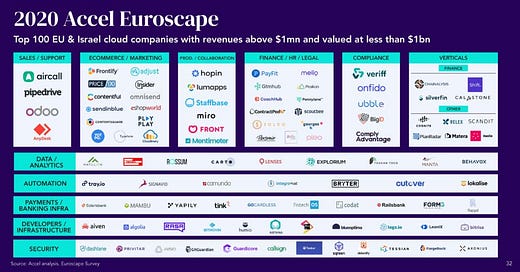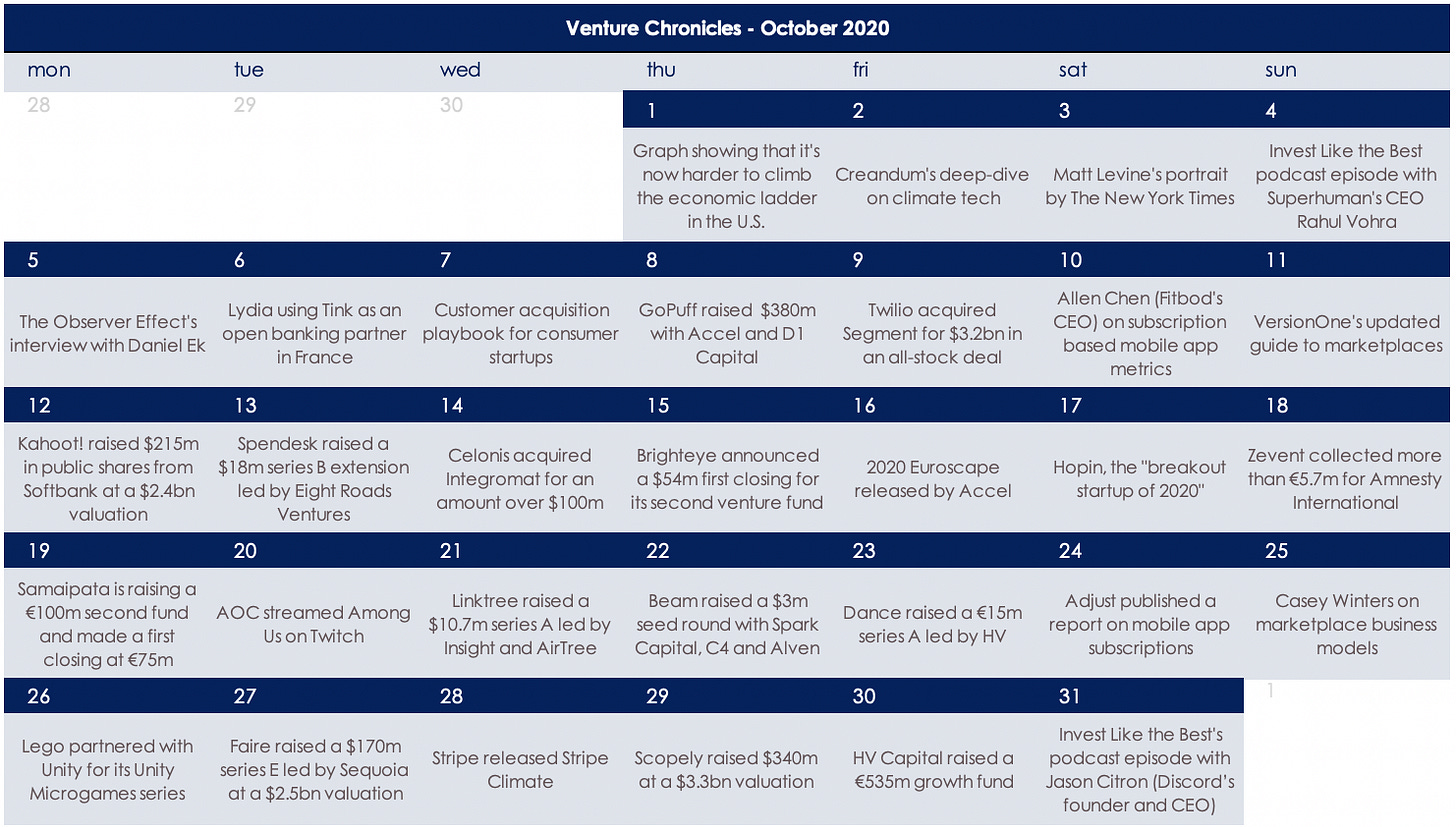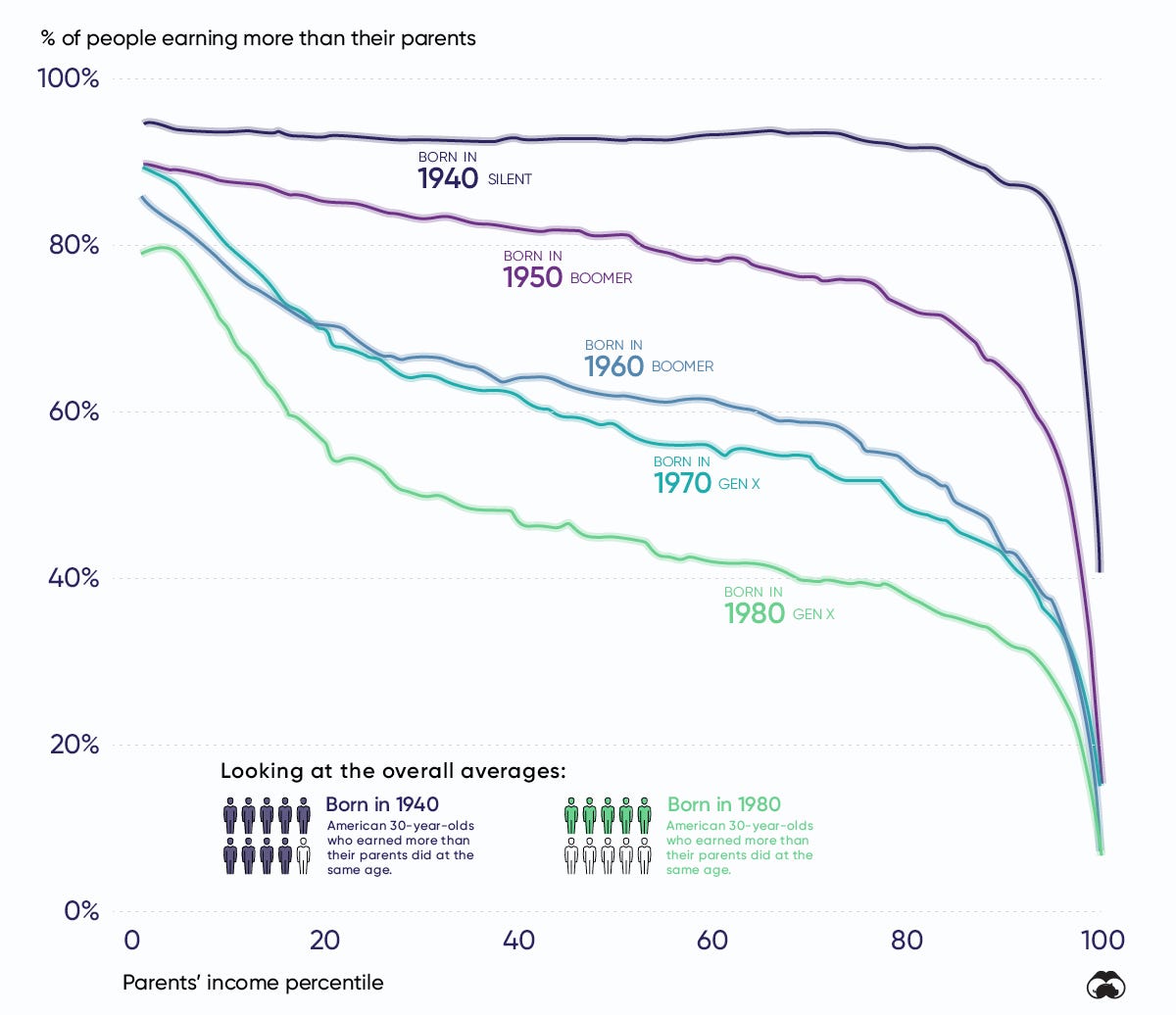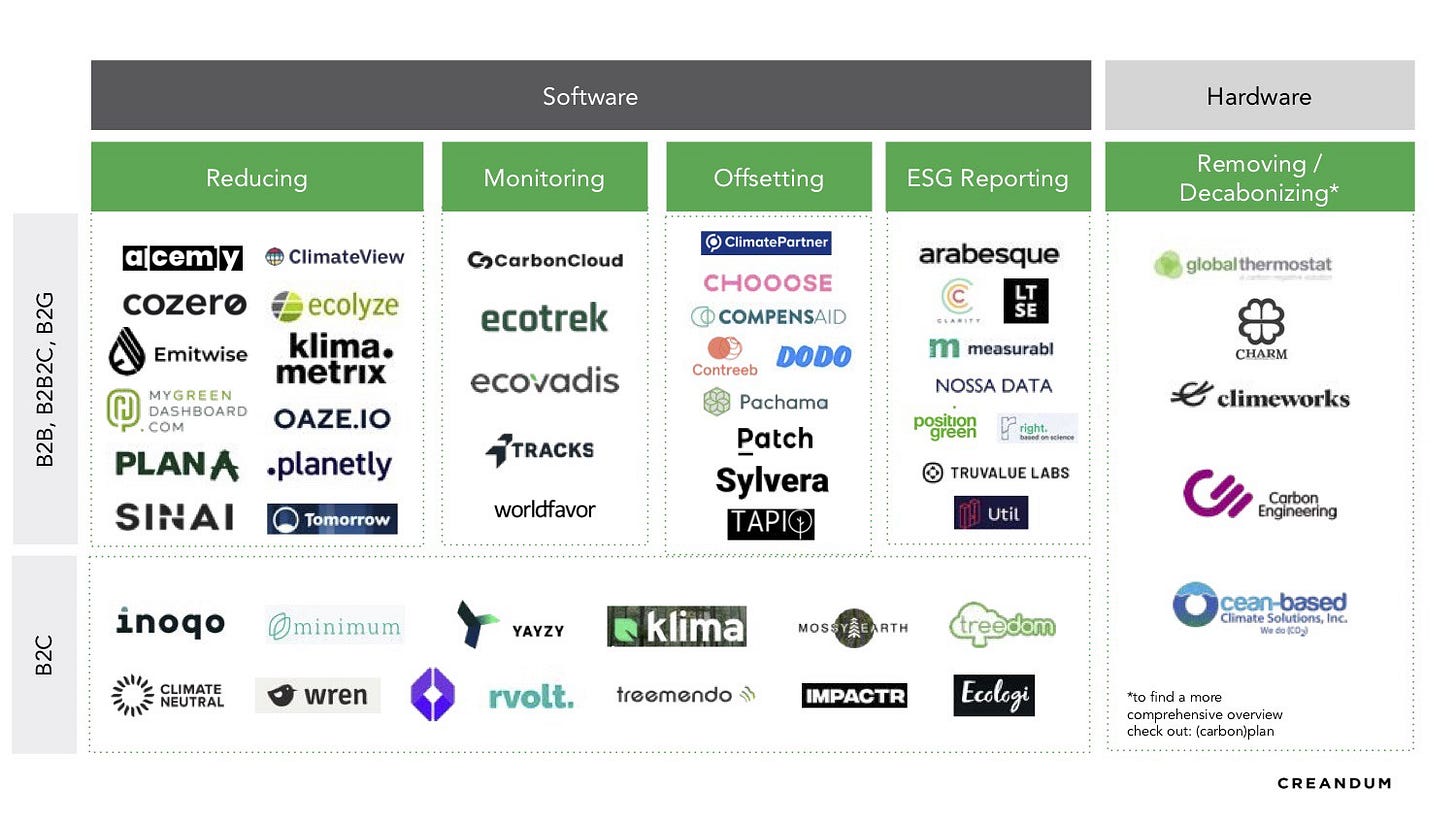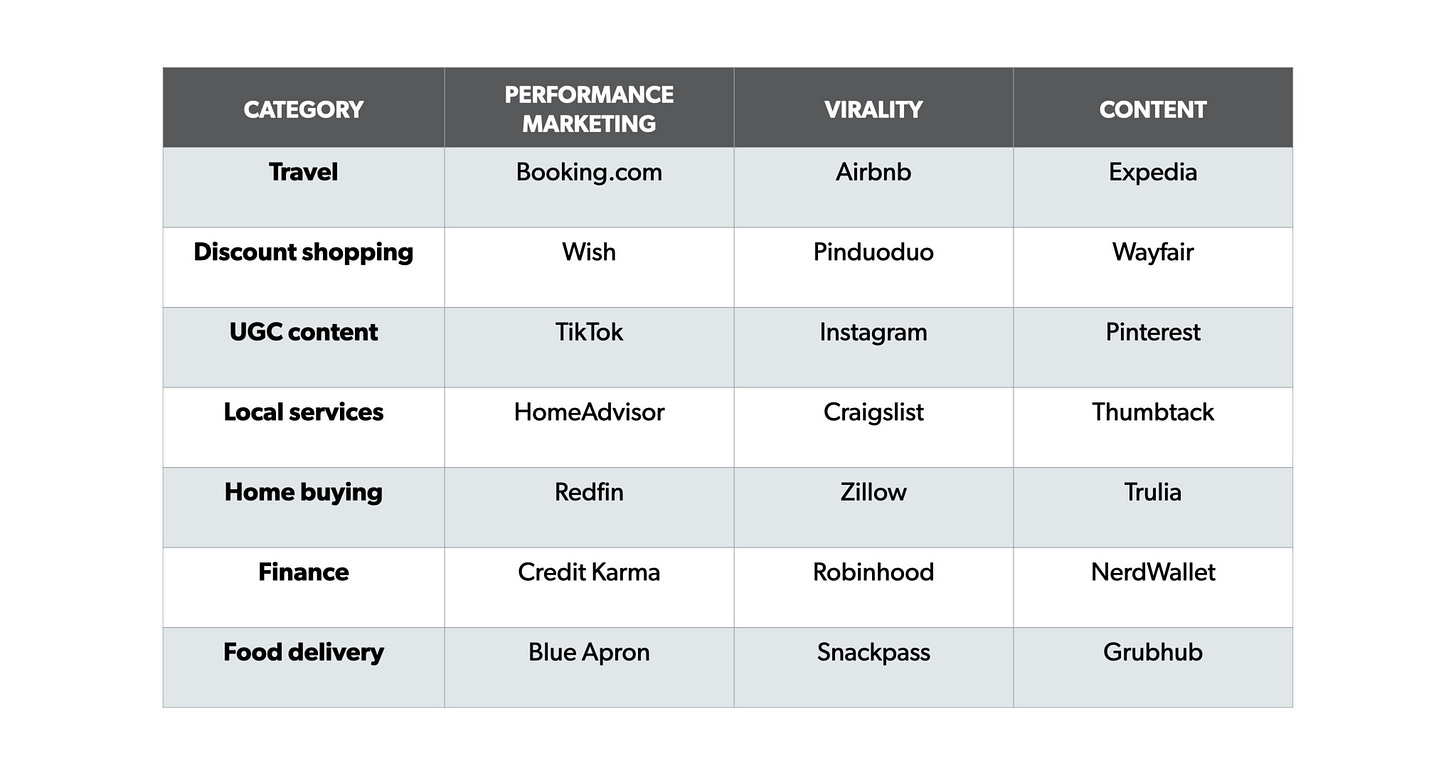Hi, it’s Alexandre from Idinvest. Overlooked is a weekly newsletter about underrated trends in the European tech industry. Today, I’m sharing the most insightful tech news of October.
For 2020, I want to pick one piece of news per day and write a short comment about it. I want to talk about something that strikes me. Something that happened in the tech ecosystem. Here is the issue for October!
Please note that the date picked for each event is not always the exact date of the event but the date I decided to write about the event.
Thursday, Oct. 1st: I found another interesting graph highlighting the fact that it has become harder for Americans to climb the economic ladder from generations to generations. I don't know if it's because the social ladder is broken or if it's because younger generations have a conception of happiness that has much less to do with money than it was in the past. (Visual Capitalist)
Friday, Oct. 2nd: Stockholm-based venture fund Creandum wrote a nice and sharp deep-dive on climate tech. If you are interested in the space, check the landscape that Clément Vouillon did a few months ago. (Creandum)
Saturday, Oct. 3rd: The New York Times did a brillant portrait of Matt Levine. He is working at Bloomberg and write a daily newsletter on finance called Money Stuff that has 150k subscribers. Matt wakes up every weekday at 5am to write his daily missive that can reach up to 5k words. He was a former banker at Goldman and knows everything about finance. If you have never heard of Matt, you should definitely check out his newsletter and this portait. (The New York Times)
Sunday, Oct. 4th: I listened to an Invest Like the Best podcast episode with Superhuman's CEO Rahul Vohra. He is probably the best storyteller I've ever heard in tech but he is also a great entrepreneur and successful startup growth playbook designer. (Invest Like the Best)
You should definitely read his product market fit engine. In the past few months, I talked with many European founders evaluating their product market fit with this framework. It's a methodology in which you will ask your users a set of questions on your product. You will use the answers to measure quantitatively how far are you from product market fit (you should have 40%+ of your users very disappointed if your product were to disappear) and to determine the next steps you should focus on to get closer to this point.
I also love how he uses game design as a key principle to build products. You don't want to build product that users want or need but you want to build products that people love to play with. This is the extra level beyond product market fit: people have fun using your software because they don't use it but they play it.
Monday, Oct. 5th: Spotify's founder and CEO Daniel Ek sat down with the Observer Effect for a long format interview in which he shared insights on topics like time management, leadership, learning and long term strategy. (The Observer Effect)
Tuesday, Oct. 6th: Lydia will be using Tink as single API to connect with all the bank accounts of its users. It's a flagship customer in France for Tink as Lydia has a great reputation for having built one of the best mobile financial product in the market. (Techcrunch)
Wednesday, Oct. 7th: Lenny Rachitsky and Dan Hockenmaier wrote a customer acquisition playbook for consumer startups explaining how to pick and grow one of the three main acquisition paths: performance marketing, virality and content. (Firstround)
Thursday, Oct. 8th: Philadelphia-based startup GoPuff raised a $380m round at a $3.9bn valuation led by Accel and D1 Capital Partners. GoPuff is a fast delivery service for convenience purchases. In less than 30 minutes, you can order and receive products like food, drinks, electronics, essential for pets. By leading the round, Accel doubled down in the startup that the fund had first financed backed in 2018. GoPuff has a vertically integrated model in which they buy products directly from CPG brands and have them delivered thanks to 200 fulfilment centers and a fleet of independent drivers. (Techcrunch)
Friday, Oct. 9th: Twilio acquired Segment for $3.2bn in an all-stock deal. The API to run your communication services (phone, video and text) is buying the API to run your marketing stack. It's a brillant move from Twilio that is adding a layer on top of its communication platform to help its clients better engage with their end customers thanks to the visibility on customer data that Segment will bring. (Semil Shah, Techcrunch, Twilio)
Saturday, Oct. 10th: I watched a presentation from Allen Chen (Fitbod's CEO) on the metrics that you should track when you are building a mobile app monetised through a subscription business model. (This Week in Startups)
Fitbod is a mobile app that leverages health data to enable anyone to develop a weekly fitness habit. It tracks your workout data when you go to the gym and uses machine learning to build the next workouts based on your profile, your preferences and your historical workouts data. It removes the friction to have to build a workout plan the next time you go to the gym.
Fitbot went from 8k subscribers and $72k ARR in Q1-2017 to 120k subscribers and $8m ARR in Q1-2019. It has also a 12% conversion rate between downloads and subscription and a 70% organic acquisition rate.
Allen highlights three fundamental metrics in subscription models:
True DAUs: computed by the number of daily active users out of which you will subtract the number of daily downloads to subtract the acquisition phase of the funnel. If your number of DAUs is growing only thanks to new downloads, you should stop acquisition and work on the product to have also the true DAUs number also increase overtime. This "true" component could be applied to any action relevant for your user-base (e.g people starting and completing a workout).
Forecasted CAC: in a mobile app, people can convert when they first download the app but also in the following weeks. You should use your past weekly cohorts for conversion rate evolution overtime to apply it to your new cohort and compute the right forecasted CAC for your business. For each cohort, the CAC will decrease overtime because users have more time to complete the free trial and subscribe. You have to set your ad budget based on where your CAC will settle.
Forecasted LTV: churn will decrease over time as your users get hooked in the product. To estimate the 2-year LTV, you will add the revenue estimated that is obtained thanks to the monthly evolution of your retention rate.
Sunday, Oct. 11th: VersionOne released the third edition of its guide to marketplaces. It's a good starting point to dig into the second most plebiscited business model by venture investors after SaaS. (VersionOne) The guide highlights three growing trends in marketplaces:
B2B marketplaces: it's seems that B2B marketplaces are having their moment thanks to two main factors which are the generational shift towards millennial leaders as well as the rise of the right tech stack to solve B2B-related issues (payment, data flows, shipment management etc.).
API-as-a-marketplace: the transaction does not happen on an application layer but on the infrastructure layer and is abstracted from the end users. It's a dev tool that connect both buyers and suppliers through an API. VersionOne is using Shippo as an example which is a API that can be used by developers to connect businesses to shipping carriers.
Decentralized marketplaces: every marketplace could become powered by a blockchain removing the need of a trusted intermediary between supply and demand
Monday, Oct. 12th: Kahoot! raised $215m in public shares from Softbank at a $2.4bn valuation. The Norwegian startup is providing (i) an online learning platform for children at school and (ii) a platform for corporate to provide corporate trainings materials. In both cases, users can consume but also create educational content (100m user-generated "Kahoots" were created in the past 12m) and the experience is built around the idea of gamification. (Techcrunch)
Tuesday, Oct. 13th: Spendesk raised a $18m series B extension led by Eight Roads Ventures. Initially, the company raised a $38m series B led by Index back in September 2019. It's a spend management solution: cards are issued for employees to better manage their expenses with a platform to centralize invoices and receipts, specific limitations on spendings that can be set up by the management etc. Spendesk is used by 40k employees from customers like Algolia, Curve, Doctolib, Raisin and Wefox. (Techcrunch)
Wednesday, Oct. 14th: Celonis acquired Integromat for an amount over $100m. Integromat is a boostrapped Czech startup building a Zapier-like solution used by 11k customers and generating $10m in annual sales. Celonis is a German company valued over $2.5bn specialised in process mining. It will scan all the logs in the information systems of an organization to map all its processes. Once this is done, Celonis is improving these processes to make them more efficient or to remove useless ones. Integromat will help Celonis offering an additional service for enhancing mapped processes through task automation. (Techcrunch)
Thursday, Oct. 15th: Brighteye announced a $54m first closing for its second venture fund to back European startups in the education sector. The fund invests in seed and series A with tickets that can reach up to $5m. It has invested into companies like Ornikar, Tandem and Epic! (Techcrunch)
Friday, Oct. 16th: Accel released its 2020 Euroscape report covering the 100 most promising European SaaS companies. I'm sharing below the list of European SaaS valued over $1bn as well as the landscape of promising early stage company. It's great to have so many Idinvest/Eurazeo portfolio companies in both categories. Accel is also sharing key hot SaaS topics for the coming months: remote working, online healthcare, hyperautomation, finance infrastructure as well as cybersecurity.(Philippe Botteri, Tech.eu)
Saturday, Oct. 17th: Semil Shah picked Hopin, a platform to organise online event, as the "breakout tech startup of 2020." Every year, he is picking a single early stage company that has the potential to reshape or create a new category. It's noteworthy because he is a good picker: Stripe in 2012, Snap in 2013, Slack in 2014, Coinbase in 2017, Airtable in 2018 and Superhuman in 2019. I agree with the pick - even if it's relatively easy to make it when you know that the company is reporting to raise a round at a $2bn pre money valuation. I'm impressed by the growth trajectory of the company that was founded only in 2019 but also by the fact that this trajectory was already outstanding before covid (60% MoM growth before Oct. 2019 with thousands of people on a waitlist to use the product). (Semil Shah)
Sunday, Oct. 18th: The French online streaming event on Twitch called Zevent collected more than €5.7m for Amnesty International for its fourth annual edition. For three days, the most 50 French streamers gathered in an hotel in Montpellier to stream games and special events to collect donations. (🇫🇷Les Echos)
Monday, Oct. 19th: Samaipata is raising a €100m second fund and made a first closing at €75m. Its first €30m fund was invested into 17 companies across Spain, France, UK, Italy and Germany including 21Buttons, Procsea, Streamloots, Matera, FoodCheri and Totem. The second fund will invest up to €1.5m in 20-25 seed startups all over Europe. (Sifted)
Tuesday, Oct. 20th: Alexandria Ocasio-Cortez, the rising star of the US Democrat party, made a Twitch live on Among Us (a multiplayer collaboration game with a similar spirit to Werewolf game) with two famous streamers that reached a 240k concurrent viewers peak. It was a way to push people to vote but it was also the first time that an American politician is using Twitch to play a game.
Wednesday, Oct. 21st: Australian startup Linktree raised a $10.7m series A led by Insight and AirTree. It's a product to aggregate nicely all the links you want to display to your audience and to reduce it to a single link that you can add into your Instagram or Twitter biography. The company seems to have a nice traction with 8m profiles created on the platform, 1bn visits in September and 28k new daily users signing up. (Techcrunch)
Thursday, Oct. 22nd: Beam raised a $3m seed round with Spark Capital, C4 and Alven. Its founder, Dominique Leca, has already sold two companies he cofounded: Sparrow sold to Google in 2012 for €25m and Stuart sold to La Poste in 2017 for €13m. He is building a next generation browser and note taking app that will automatically aggregate knowledge based on how you browse the Internet. After each search, you will have access to a pre-built note on the topic you were looking into and you will be able to re-arrange it. (Beam, Tech.eu, Techcrunch)
Friday, Oct. 23rd: Dance is raising a €15m series A led by HV. I covered the company's seed round few months ago. It's a e-bike all-inclusive subscription service (maintenance, insurance, mobile app, GPS location tracking etc.) founded by SoundCloud co-founders. The service is in pilot with invite-only users in Berlin. The subscription model allows to avoid the expensive upfront costs to buy a good ebike and to avoid the hassle to repair them. (Techcrunch)
Saturday, Oct. 24th: Idinvest/Eurazeo's portfolio company Adjust published a report on mobile app subscriptions and released a subscription tracking product. (VentureBeat)
American people spend on average $20.78 per month on mobile app subscriptions - with people 25-34 y.o. spending more ($25.85) and people over 55 y.o. spending less ($13.97).
With covid, 17% consumers stopped paying for a physical service to replace it by a digital subscription (paying for a fitness app instead of going to the gym).
Sunday, Oct. 25th: Casey Winters wrote a blog post digging into the different gradients of the marketplace business model. It's interesting to clarify the value proposition that you should bring to both sides of the marketplace and to calibrate your services and take rate accordingly. (Casey Accidental)
Monday, Oct. 26th: Lego partnered with Unity for its Unity Microgames series. You can now build and play games with Lego bricks and characters within Unity without having coding skills and just using a drag and drop interface. With the modularity of its blocks, Lego is obviously the perfect candidate for a no-code game builder. For Unity, offering no code tooling is a way to go after Roblox by reducing the friction to build on its platform and empowering creators that will later learn how to code to build more complex games on Unity. (Unity, The Verge)
Tuesday, Oct. 27th: US-based B2B wholesale marketplace Faire raised a $170m series E led by Sequoia at a $2.5bn valuation. It helps brands to add or manage a new B2B wholesale distribution channels by connecting them with small physical stores - which are looking for a great solution to discover and buy new products. Faire was founded in 2017 by four former Square employees and raised more than $400m in total with tier one investors like YC, Khosla, Founders Fund, DST and Lightspeed. (Forbes)
Wednesday, Oct. 28th: Stripe released Stripe Climate to make it easy and free for its merchants to give a percentage of their revenues to fund carbon removal technologies. For now, the merchants can chose to fund projets in the space already funded by Stripe's annual $1m commit into carbon removal technologies. (ProductHunt, Techcrunch)
Thursday, Oct. 29th: Scopely raised $340m at a $3.3bn valuation from investors like Welligton, TSG, CCP and Blackrock. Scopely is a mobile game developer and publisher with two key assets: (i) a vertically integrated model to manage both development and publishing and (i) the ability to develop mobile games based on famous IPs like Scrabble, Marvel, Start Trek, Looney Tunes, The Walking Dead etc. (Techcrunch)
Friday, Oct. 30th: HV Capital (ex. Holtzbrinck Ventures) raised a €535m growth fund to invest into European companies from seed to series C. Before this new fund, HV was mainly a seed and series A investor. The ability to invest in series B and series C will allow HV to invest in companies the fund missed in previous stages and will contribute to fill the gap in growth funding in Europe. HV has an outstanding track record with investments in companies like Delivery Hero, Zalando, Hello Fresh, Cabify, Depop and Flixbus. 70% of the fund will be invested into Germany and 30% in the rest of Europe. (Sifted)
Saturday, Oct. 31st: I listened to an Invest Like the Best's podcast episode with Jason Citron who is Discord’s founder and CEO. It's a social network to talk through voice, video and texts with small communities and with your friends. It started in the gaming space but Discord is now powering much more horizontal use cases (e.g. classes using Discord during the lockdown to keep chatting and organising remote classes) Below are my favorite learnings on the company's journey. (Invest Like the Best)
Product building is very similar to science. You will start shipping a product with the minimal set of features that will help you test an hypothesis. You will interpret the feedback from your users to refine your hypothesis and enhance your product until reaching product market fit. You have product market fit when you have the right amount of signal from core users. They are using your product with absurdly high usage and retention metrics. The key is to have the shortest feedback loop between two iterations to keep moving in the right direction and to document methodically every steps in the process.
You can monetize a social network without advertising. Facebook, Instagram, Twitter, Youtube and all the other major social networks are monetized through advertising. It creates a misalignment between the platform and its users as the platform will inevitably deteriorate the user experience to push advertising. Discord is monetizing through Discord Nitro which is a $4.99 or $9.99 monthly subscription to get an augmented Discord experience with benefits like better emojis, a personal avatar, server boosts, badges and enhance performance quality for videos and downloads.
Discord is not just a gaming social network. In a survey done in 2019, 30% users said that they were not using Discord for gaming as a primary use case. The company reshaped the vision around the broader idea of "finding belonging in the world".
Thanks to Julia for the feedback! 🦒 Thanks for reading! See you next week for another issue! 👋

